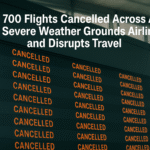Ha Long Bay, Vietnam — July 21, 2025 — One of Vietnam’s most beloved tourist destinations, the UNESCO-listed Ha Long Bay, turned into a scene of heartbreak this weekend as a sudden storm caused the Wonder Sea tourist boat to capsize, claiming 37 lives and leaving five passengers missing.
The vessel, which carried 48 tourists and five crew members, overturned on July 19 while navigating the bay’s iconic limestone karsts. Survivors and officials describe how the boat was struck by intense winds, torrential rain, and hail around 2 p.m. local time. By Sunday, emergency responders had rescued 11 individuals and recovered most of the bodies, including three crew members found inside the submerged cabin.
Among the deceased were multiple families from Hanoi, including over 20 children. Several passengers were on day cruises when the violent storm hit—many without time to seek shelter or reach life jackets.
Survivors Recall Harrowing Escapes
A 10-year-old boy who survived the ordeal said he managed to dive through a narrow gap in the wreckage and swim to the surface before being spotted by rescuers. In another miraculous moment, a 14-year-old was found four hours later alive in an air pocket inside the overturned boat.
These stories, while inspiring, underscore the lack of time passengers had to respond to the sudden shift in weather. Rescue operations, involving Vietnam’s Coast Guard and military patrols, resumed early Sunday and are still underway for the missing five.
Sudden Weather Change, Not Typhoon Wipha
Contrary to initial fears, the storm that triggered the capsizing was not directly related to Typhoon Wipha, which remains active in the South China Sea. Instead, Vietnam’s National Centre for Hydro-Meteorological Forecasting confirmed that intense local convective activity caused the abrupt weather. Other northern provinces—Hanoi, Bac Ninh, and Thai Nguyen—also reported damage from the same storm system, including uprooted trees and flash floods.
Government Response and Investigation
Vietnamese Prime Minister Pham Minh Chinh expressed condolences to the victims’ families and directed national defense forces to assist in rescue and recovery operations. A full investigation into the causes and any safety lapses is underway, with early reviews focusing on the boat’s design, crew training, and storm preparedness.
The Ministry of Transport is expected to revise regulations for tour boats operating in coastal waters. The Wonder Sea had passed safety inspections earlier in 2025, but questions remain about the adequacy of emergency protocols, communication systems, and passenger safety briefings.
Ha Long Bay: A Tourist Jewel Marred by Recurring Accidents
Ha Long Bay draws over 2.6 million visitors annually with its emerald waters and limestone formations, and was named a UNESCO World Heritage Site in 1994. But the bay has a tragic history of maritime accidents. In 2011, 12 tourists died when a cruise boat sank in similar conditions. Just last year, Typhoon Yagi caused significant damage in Quang Ninh Province, including the loss of several small vessels.
Regional Implications for Maritime Tourism
This latest disaster is sparking regional and international concern about the rising frequency of maritime incidents during storm season in Southeast Asia. Just two weeks ago, a ferry accident off Bali’s coast killed 18 people. With climate change intensifying weather unpredictability, travel providers may now be forced to act.
Key industry reactions include:
- Mandatory Real-Time Weather Systems: Tour boats may be required to install advanced monitoring tools linked to national meteorological services.
- Enhanced Crew Safety Training: Mandatory certification in storm protocols, CPR, and emergency passenger evacuation.
- Stricter Licensing and Insurance: Government-issued licenses may now require compliance with new seasonal operation windows and risk audits.
- Emergency Equipment Checks: Life jackets, life rafts, and distress communication devices to undergo routine verification.
Impact on Traveler Behavior and Industry Costs
Experts suggest the tragedy may reshape how travelers choose destinations and experiences. Booking decisions may increasingly factor in weather trends, emergency readiness, and vessel safety records.
“People will likely prioritize transparency,” said Nguyen Thi Linh, a tourism analyst based in Hanoi. “Operators who highlight their safety credentials and seasonal awareness may see a competitive edge.”
Insurance companies are also expected to revise coverage for maritime excursions, with premiums rising for routes through high-risk zones during monsoon months.
Meanwhile, small tour operators face potential financial strain due to the added compliance costs. Some may reduce operations during storm season altogether or shift focus to inland destinations.
A Wake-Up Call for Southeast Asia’s Tourism Sector
Vietnam’s tragedy serves as a broader call for maritime reform across Southeast Asia. Governments in Thailand, Indonesia, and the Philippines—all heavily dependent on marine tourism—are reportedly reviewing current boating regulations.
The Asian Development Bank (ADB) recently identified coastal tourism safety as a vulnerability in its regional tourism sustainability report. Ha Long’s tragedy may accelerate the push for unified ASEAN maritime safety guidelines.
Conclusion: Safety Must Come Before Scenery
The Wonder Sea disaster is a sobering reminder that even the most picturesque destinations must take disaster preparedness seriously. As Ha Long Bay mourns its dead, the global tourism industry faces a defining moment—choosing between complacency or a culture of safety.
Let this tragedy mark a turning point toward proactive, standardized, and transparent maritime practices that protect both tourists and the ecosystems they travel to experience.
For more travel news like this, keep reading Global Travel Wire
















